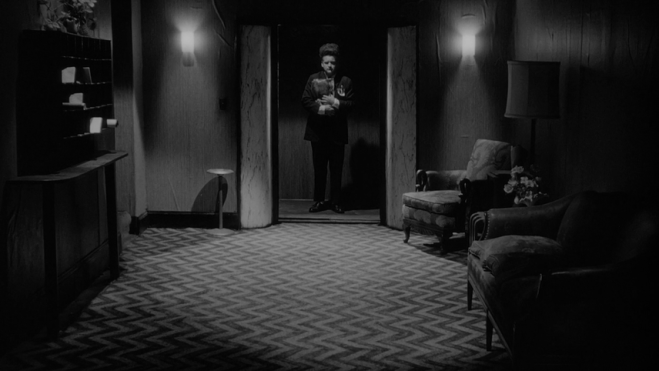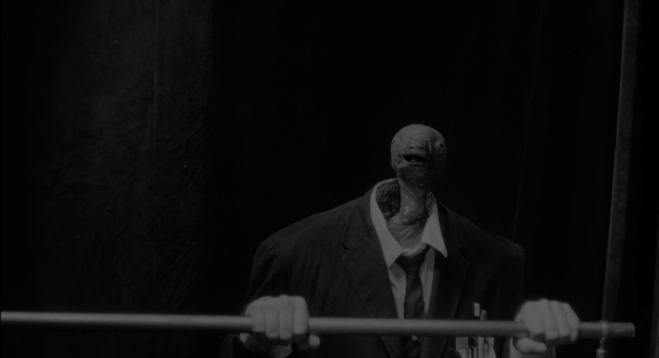
When John offered me the chance to revisit Eraserhead for this year’s Shocktober, I jumped at the chance much more so I could watch it rather than actually write about. Because even from the one experience I had watching Eraserhead back in high school, which was on some streaming site (probably in like 240p), I found that watching Eraserhead is an experience unlike any other. The film is atmospheric, unsettling, and one of the most truly bizarre American films ever made. But because it is a film that is so uniformly abstract, and so entrenched in mood and feeling rather than the conventions we usually associate with most movies, it’s hard to wrap any sort of words around what exactly this batshit film is. But I’ll see what I can do.
Explaining the plot of Eraserhead is probably not the best way of summarizing the appeal of this film, but I think it does illustrate the absurd level this movie is operating on. Eraserhead begins with a prologue that involves a “Man In The Planet” who seems to be pulling some mechanical levers from god knows where, before we see some images of these weird sperm-shaped embryo things that recur throughout the film. We’re then introduced to Henry Spencer (Jack Nance), an ordinary guy with a questionable hairdo who’s living in some sort of industrial wasteland. He then gets invited to dinner by his casual girlfriend Mary X (Charlotte Stewart), to have dinner with her parents Mr. and Mrs. X to a meal of tiny roasted chickens that apparently start moving and bleeding when you cut in to them. We then cut to some time later, where Mary and Henry are married and living together with their new baby who looks like some sort of tiny unborn sheep’s head, while Henry constantly dreams about a lady that lives in his radiator. So yeah, I think you get the picture. Pretty weird stuff.
Packaged with the recently released Criterion edition of Eraserhead (which I just picked up), there’s an extended interview with director David Lynch where he talks about how he wanted Eraserhead to be the kind of film where you could hang different interpretations on it at different points in your life. And seeing as though I’m now in a much different place than I was when I first discovered this film many years ago, I’d say he accomplished this feat. Because watching it the first time, I was much more impressed by the film on a more technical level, as the film’s sound design (which was done by Lynch and Alan Splet) stuck out to me as containing some of the most haunting and effective sound in any movie I can think of. It has this constant drone to it, which never lets up, and in turn never lets us escape from the nightmarish world that this movie inhabits.
Also, the black and white cinematography (done by Herbert Cardwell, and then Frederick Elmes who replaced him about a year into the film’s sporadic five-year long shoot) is pretty stunning. And when you combine that with these weird images and just plain weird people that inhabit this world, I strangely have a hard time looking away. Which is remarkable, since the film’s nonsensical and abrasive nature seems to be taunting the audience into looking away or just turning the movie off. So maybe it was the film’s dark beauty that initially drew me in, even though I remember reasoning that I was able to make it all the way through this film the first time mainly because I couldn’t stop myself from wanting to see what fucked up directions it could possibly go in next.
Watching Eraserhead again earlier this week, I think all these things still hold true, yet I was struck most by the fact that when you break it down to its essentials, Eraserhead is actually a very human and (dare I say it) relatable story. Though they manifest themselves in absurd and sometimes incomprehensible ways, Henry’s fears (which we can safely say reflected Lynch’s own) about adulthood and fatherhood are what the film is really about, and probably what continues to make the film resonate. Jack Nance even has this very everyman quality about him, or at least he would if it wasn’t for his foot-and-a-half of hair standing on end. And I think that speaks to why this movie is still talked about rather than being disregarded as random absurdist bullshit — because it’s essentially about the world we live in, it’s just that everything has been tweaked ever so slightly so as to appear strange and terrifying.
That also answers another thing that should probably be addressed in relation to Shocktober, which is whether Eraserhead even qualifies as a horror film. I mean it does feel a little odd to regard it as a contemporary of any of the other horror films we’ll be talking about (though House does sound similarly bonkers, but in a different kind of way). However, if the aim of any horror movie is to instill chills in the viewer while also putting them in a constant state of unease, I’d say Eraserhead undoubtedly qualifies as horror. As this film truly is a nightmare brought to life, and hell, it even has its own monster at the center of it in the form of that disturbing “baby”. Which, yikes. I want to punch my own dick just thinking about it.
“Hey, guys. Wha’s goin’ on?”


